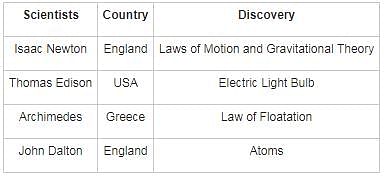Railways Exam > Railways Questions > Who among the following scientists discovered...
Start Learning for Free
Who among the following scientists discovered the Law of Floatation?
- a)Newton
- b)Thomas Edison
- c)Archimedes
- d)John Dalton
Correct answer is option 'C'. Can you explain this answer?
| FREE This question is part of | Download PDF Attempt this Test |
Verified Answer
Who among the following scientists discovered the Law of Floatation?a)...

Most Upvoted Answer
Who among the following scientists discovered the Law of Floatation?a)...
Archimedes
Archimedes' principle, physical law of buoyancy, discovered by the ancient Greek mathematician and inventor Archimedes, stating that any body completely or partially submerged in a fluid (gas or liquid) at rest is acted upon by an upward, or buoyant, force the magnitude of which is equal to the weight of the fluid ...
Archimedes' principle, physical law of buoyancy, discovered by the ancient Greek mathematician and inventor Archimedes, stating that any body completely or partially submerged in a fluid (gas or liquid) at rest is acted upon by an upward, or buoyant, force the magnitude of which is equal to the weight of the fluid ...
Free Test
FREE
| Start Free Test |
Community Answer
Who among the following scientists discovered the Law of Floatation?a)...
The correct answer is option 'C', Archimedes.
Archimedes was a Greek mathematician, physicist, engineer, inventor, and astronomer who lived during the 3rd century BC. He made numerous significant contributions to various fields of science and mathematics. One of his most famous discoveries is the Law of Floatation.
The Law of Floatation, also known as Archimedes' principle, states that an object placed in a fluid experiences an upward buoyant force equal to the weight of the fluid it displaces. In simple terms, it explains why objects float or sink in a fluid.
Here is a detailed explanation of Archimedes' discovery of the Law of Floatation:
1. Background and Problem:
During ancient times, Archimedes was given a task by King Hiero II of Syracuse. The king suspected that his goldsmith had cheated him by replacing some of the gold in a crown with a less valuable metal. Archimedes was asked to determine if the crown was made of pure gold or not, without damaging it.
2. Insight and Eureka Moment:
Archimedes was pondering over the problem when he stepped into a bath and noticed the water overflowing. He realized that the water that overflowed from the bath was equal in volume to the part of his body that was submerged. This observation led him to make a crucial connection between the volume of water displaced by an object and the buoyant force acting on it.
3. Experiment and Verification:
To test his hypothesis, Archimedes conducted a series of experiments. He immersed different objects, including a crown made of pure gold, in water and measured the volume of water displaced. By comparing the volume of water displaced by the crown to that of an equal weight of pure gold, he was able to determine whether the crown was made of pure gold or not.
4. Conclusion and Law of Floatation:
Archimedes concluded that if the weight of an object is less than the weight of the fluid it displaces, it will float. Conversely, if the weight of an object is greater than the weight of the fluid it displaces, it will sink. This became known as Archimedes' principle or the Law of Floatation.
Archimedes' discovery of the Law of Floatation not only solved the king's problem but also laid the foundation for understanding buoyancy and the behavior of objects in fluids. His contribution revolutionized the fields of physics and engineering and continues to be relevant to this day.
Archimedes was a Greek mathematician, physicist, engineer, inventor, and astronomer who lived during the 3rd century BC. He made numerous significant contributions to various fields of science and mathematics. One of his most famous discoveries is the Law of Floatation.
The Law of Floatation, also known as Archimedes' principle, states that an object placed in a fluid experiences an upward buoyant force equal to the weight of the fluid it displaces. In simple terms, it explains why objects float or sink in a fluid.
Here is a detailed explanation of Archimedes' discovery of the Law of Floatation:
1. Background and Problem:
During ancient times, Archimedes was given a task by King Hiero II of Syracuse. The king suspected that his goldsmith had cheated him by replacing some of the gold in a crown with a less valuable metal. Archimedes was asked to determine if the crown was made of pure gold or not, without damaging it.
2. Insight and Eureka Moment:
Archimedes was pondering over the problem when he stepped into a bath and noticed the water overflowing. He realized that the water that overflowed from the bath was equal in volume to the part of his body that was submerged. This observation led him to make a crucial connection between the volume of water displaced by an object and the buoyant force acting on it.
3. Experiment and Verification:
To test his hypothesis, Archimedes conducted a series of experiments. He immersed different objects, including a crown made of pure gold, in water and measured the volume of water displaced. By comparing the volume of water displaced by the crown to that of an equal weight of pure gold, he was able to determine whether the crown was made of pure gold or not.
4. Conclusion and Law of Floatation:
Archimedes concluded that if the weight of an object is less than the weight of the fluid it displaces, it will float. Conversely, if the weight of an object is greater than the weight of the fluid it displaces, it will sink. This became known as Archimedes' principle or the Law of Floatation.
Archimedes' discovery of the Law of Floatation not only solved the king's problem but also laid the foundation for understanding buoyancy and the behavior of objects in fluids. His contribution revolutionized the fields of physics and engineering and continues to be relevant to this day.
Attention Railways Students!
To make sure you are not studying endlessly, EduRev has designed Railways study material, with Structured Courses, Videos, & Test Series. Plus get personalized analysis, doubt solving and improvement plans to achieve a great score in Railways.

|
Explore Courses for Railways exam
|

|
Similar Railways Doubts
Who among the following scientists discovered the Law of Floatation?a)Newtonb)Thomas Edisonc)Archimedesd)John DaltonCorrect answer is option 'C'. Can you explain this answer?
Question Description
Who among the following scientists discovered the Law of Floatation?a)Newtonb)Thomas Edisonc)Archimedesd)John DaltonCorrect answer is option 'C'. Can you explain this answer? for Railways 2024 is part of Railways preparation. The Question and answers have been prepared according to the Railways exam syllabus. Information about Who among the following scientists discovered the Law of Floatation?a)Newtonb)Thomas Edisonc)Archimedesd)John DaltonCorrect answer is option 'C'. Can you explain this answer? covers all topics & solutions for Railways 2024 Exam. Find important definitions, questions, meanings, examples, exercises and tests below for Who among the following scientists discovered the Law of Floatation?a)Newtonb)Thomas Edisonc)Archimedesd)John DaltonCorrect answer is option 'C'. Can you explain this answer?.
Who among the following scientists discovered the Law of Floatation?a)Newtonb)Thomas Edisonc)Archimedesd)John DaltonCorrect answer is option 'C'. Can you explain this answer? for Railways 2024 is part of Railways preparation. The Question and answers have been prepared according to the Railways exam syllabus. Information about Who among the following scientists discovered the Law of Floatation?a)Newtonb)Thomas Edisonc)Archimedesd)John DaltonCorrect answer is option 'C'. Can you explain this answer? covers all topics & solutions for Railways 2024 Exam. Find important definitions, questions, meanings, examples, exercises and tests below for Who among the following scientists discovered the Law of Floatation?a)Newtonb)Thomas Edisonc)Archimedesd)John DaltonCorrect answer is option 'C'. Can you explain this answer?.
Solutions for Who among the following scientists discovered the Law of Floatation?a)Newtonb)Thomas Edisonc)Archimedesd)John DaltonCorrect answer is option 'C'. Can you explain this answer? in English & in Hindi are available as part of our courses for Railways.
Download more important topics, notes, lectures and mock test series for Railways Exam by signing up for free.
Here you can find the meaning of Who among the following scientists discovered the Law of Floatation?a)Newtonb)Thomas Edisonc)Archimedesd)John DaltonCorrect answer is option 'C'. Can you explain this answer? defined & explained in the simplest way possible. Besides giving the explanation of
Who among the following scientists discovered the Law of Floatation?a)Newtonb)Thomas Edisonc)Archimedesd)John DaltonCorrect answer is option 'C'. Can you explain this answer?, a detailed solution for Who among the following scientists discovered the Law of Floatation?a)Newtonb)Thomas Edisonc)Archimedesd)John DaltonCorrect answer is option 'C'. Can you explain this answer? has been provided alongside types of Who among the following scientists discovered the Law of Floatation?a)Newtonb)Thomas Edisonc)Archimedesd)John DaltonCorrect answer is option 'C'. Can you explain this answer? theory, EduRev gives you an
ample number of questions to practice Who among the following scientists discovered the Law of Floatation?a)Newtonb)Thomas Edisonc)Archimedesd)John DaltonCorrect answer is option 'C'. Can you explain this answer? tests, examples and also practice Railways tests.

|
Explore Courses for Railways exam
|

|
Suggested Free Tests
Signup for Free!
Signup to see your scores go up within 7 days! Learn & Practice with 1000+ FREE Notes, Videos & Tests.
























